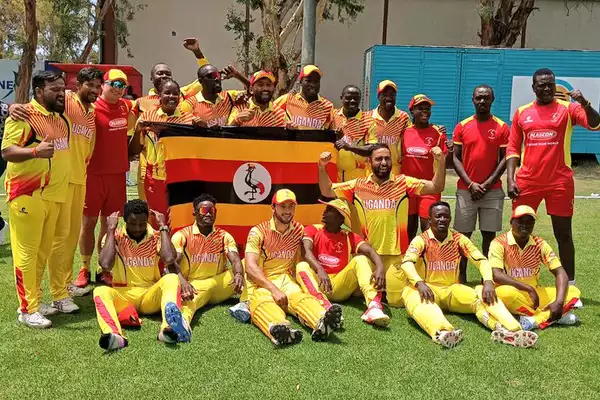
There is something distinctly remarkable about Uganda’s lions. Not only do they stride imperiously in its jungles, but they also defy expectations by climbing trees – a unique skill setting them apart from their counterparts in other forests around the world.
On Thursday, the nation’s cricketers replicated the spirit of their felines, scaling much higher than the tree-tops, metaphorically speaking, and achieved a feat of rare national grandeur by annexing a coveted spot in the T20 World Cup.
In a country recognized as one of the world’s youngest, cricket has not exactly managed to carve a niche of popularity among the youth. In that sense, it is deemed quite a feat. Football, Rugby Sevens, and Netball dominate the popular imagination but Brian Masaba’s team scripted history by becoming Uganda’s first national team to qualify for a World Cup in any sport.
“This is very uplifting and humbling,” Mike Nuwagaba, the chairman of Uganda Cricket Association (UCA), told Cricbuzz giving a perspective on the team’s historic feat. “We scripted this journey three years ago and have painfully executed the plan. This qualification reinvigorates all Associates to believe. It’s possible.”
Captain Masaba, a 32-year-old right-handed bowling all-rounder, thought that the game is growing beyond the regions unheard of by the game’s regulars. “This is huge for Ugandan cricket with regards to the exposure on a global platform. It’s an advert for cricket outside the big cricketing countries and just shows that the game can grow much faster provided with the opportunity and platform,” Masaba told Cricbuzz.
Uganda previously participated in three ICC global events, notably in the 2004 and 2006 Under-19 World Cups, as well as the recent one in 2022 in the West Indies. “This marks our inaugural qualification for the senior men’s World Cup,” Denis Musali of the UCA remarked. “Hopefully cricket will now gain in popularity in the country after this accomplishment.”
The team may hail from the cricketing backwaters of Africa, but Uganda boast players of reasonable distinction. Franco Nsubuga, a 43-year-old veteran left-arm spinner, has dedicated 27 years to the sport. Presently, he stands among the world’s best bowlers with an impressive economy rate in Twenty20 Internationals (4.78). Among those who have bowled at least 100 overs in T20Is, his economy rate is the best. “One may imagine what the World Cup participation would mean to him,” Musali said.
“For me, it’s a huge relief after all the years of disappointment and near misses,” the veteran told this website. “All my years of service finally mean something by this qualification and hopefully Ugandan cricket can continue to grow from here on,” Nsubuga, who has played 52 T20Is, said.
Cricket in Uganda finds its roots back to the late 19th century, introduced by the missionaries in 1890, just like anywhere in the world. Initially confined to the missionary schools, the sport gained a new dynamic with the arrival of an Asian workforce in the African nation. Cricket continued to thrive in the schools for a long time before capturing the interest of the local black population.
While not the most popular game, Uganda has fostered local talent, with players like Juma Miyagi and Cosmas Kyewuta who, though not currently participating in the African qualifiers in Namibia, are considered as the fastest among the African bowlers. The cricket scene is predominantly centered in the capital city of Kampala, boasting three international standard grounds, with an additional one located outside Kampala.
The team that competed in the African region qualifier at the Wanderers Cricket Ground in Windhoek, Namibia, reflects a diverse mix. Notably, Alpesh Ramjani (29, a left-handed bowling all-rounder), Dinesh Nakrani (32, a left-handed batter and pacer) and Ronak Patel (35, a right-handed batsman) are of Indian origin, while Riazat Ali Shah (25, a right-handed batter and pacer) and Bilal Hassan (33, a right-arm pacer) are of Pakistan origin.
Adding to the team’s prowess is Roger Mukasa (34), a skilled right-handed batsman and a former captain who previously participated in the 2006 Under 19 World Cup in Sri Lanka. The majority of the team consists of local players contributing to the dynamic cricket culture in Uganda, where there are 52 tribes with different ethnicities.
In Windhoek, Uganda became the second team, after hosts Namibia, to qualify for the World Cup. Their standout moment came when they defeated Zimbabwe, a Full Member of the International Cricket Council (ICC) and a Test-playing nation with extensive experience in multiple World Cups. Another notable victory came against their traditional East African rivals, Kenya, whom they outplayed. Additional triumphs included wins against Tanzania and Nigeria, with their sole defeat being against Namibia. The qualification was sealed with a convincing nine-wicket win over Rwanda on Thursday, securing their place as the last of the 20 teams for the tournament in the West Indies and the US next June.
Apart from hosts West Indies and the USA, direct qualifiers for the tournament include Australia, India, Pakistan, England, South Africa, Netherlands, Sri Lanka, New Zealand, Afghanistan, and Bangladesh. Ireland and Scotland from Europe, Namibia and Uganda from Africa, along with Nepal, Oman from Asia, and PNG and Canada from the East Asia Pacific and the Americas regions, will join them as qualifiers.
UCA boss reflected upon what Thursday’s win could mean to Uganda cricket. “This opens doors to more opportunities (partnerships, funding and playing better teams). This builds hope for a better tomorrow and that’s all that is required to keep the fire burning,” Nuwagaba said, sharing the views of the national captain that cricket can flourish in places not thought of if provided with proper support.






